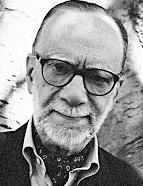

José-Augusto França (JAF) was born in Tomar into a petty bourgeois family with rural origins. The family held modest positions in public administration and commerce, a field in which his father would garner considerable success after settling permanently in Lisbon when JAF was just a few months of age. Influenced by his father, he acquired an early taste for reading (novels, poetry and newspapers), theatre and cinema. He attended the Liceu Gil Vicente in Graça and, during those years, got used to walking around and falling in love with Lisbon, which would become a fundamental component of his work. He took a degree in History and Philosophy of Science at the Faculty of Arts in Lisbon, still housed at the time in the former Convent of Jesus (1941/45). Highly critical of the type of teaching delivered,he singled out Francisco Vieira de Almeida, a philosophy professor, among the teaching staff. He never finished his degree, but it was a period of intense self-education and writing and, briefly, painting. The death of his father when JAF was twenty forced him to take on the family business and accept the possibility of a career in Angola, which he quickly abandoned. However, from that one-year experience, he wrote his first novel, Natureza Morta [Still Life] published in 1949.
From 1946, already married at this stage and supported by his wife's family (Casa Leonel, in Chiado), he began travelling,first to Madrid and then to Paris. Over the next two decades, he engaged in diverse activities, writing film and art criticism for Horizonte and Jornal das Artes.From 1947 to 1949, he was one of the founders of the Lisbon Surrealist Group (with António Pedro, Fernando de Azevedo, Marcelino Vespeira, Fernando Lemos, and others), a key gathering in shaping a number of fundamental aspects of his future career: the choice of surrealism as a determining trend in 20th-century art, which in the case of Portugal,was in perpetual conflict with Neo-Realism. In the 1950s, he became involved in regular publishing activities, co-directing the second and third series of the Cadernos de Poesia [Poetry Journals] with Jorge de Sena, José Blanc de Portugal, and Ruy Cinatti, directing the journal Córnio (author-published, 5 issues, 1951-56), and writing regularly for O Comércio do Porto [The Commerce of Porto] (1952-54).
